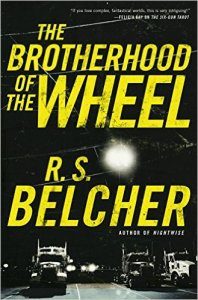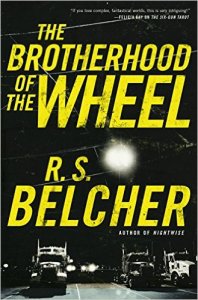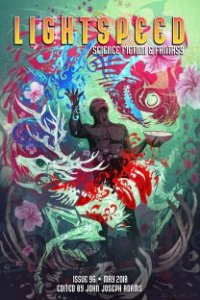Faren Miller reviews R.S. Belcher
The Brotherhood of the Wheel, R.S. Belcher (Tor 978-0-7653-8028-5, $26.99, 384pp, hc) March 2016.
 Though Tor calls R.S. Belcher’s The Brotherhood of the Wheel an ‘‘urban fantasy,’’ it also describes the novel as set on ‘‘the haunted byways and truck stops of the US Interstate Highway System.’’ Roads – both real and metaphorical – are crucial to this dark fantasy, focusing and expanding the power of magics that range from the latest trends in ghosts and weird critters discussed on bad-ass websites, to entities transplanted to the New World from pre-Christian Europe and points beyond.
Though Tor calls R.S. Belcher’s The Brotherhood of the Wheel an ‘‘urban fantasy,’’ it also describes the novel as set on ‘‘the haunted byways and truck stops of the US Interstate Highway System.’’ Roads – both real and metaphorical – are crucial to this dark fantasy, focusing and expanding the power of magics that range from the latest trends in ghosts and weird critters discussed on bad-ass websites, to entities transplanted to the New World from pre-Christian Europe and points beyond.
We begin with big rig truck driver Jimmie Aussapile, one of what proves to be a wonderfully miscellaneous bunch of people who oppose the forces of evil in tense scenes that gradually reveal connections between events in towns, suburbs, and cities of the Midwest and the South: Illinois, Kansas, Tennessee, Louisiana. Appearing near the mid-point of Belcher’s previous novel Nightwise, Jimmie, his tractor trailer, and a passing mention of the Brotherhood prompted Belcher’s literary agent to urge him to write more about them, as noted in the Acknowledgements here. I’m delighted that he followed her suggestion, in his own devious way. He has a masterful ability to move between assorted viewpoint characters in multiple plotlines kept separate long enough to become distinct: just hinting at links that may strengthen, but don’t become full alliances until hard action with shared danger breaks down the barriers between them.
At first, few of these people entirely believe in the occult. Though Hector ‘‘Heck’’ Sinclair – a striking young man whose accent holds ‘‘a touch of North Carolina by way of Glasgow,’’ while his ‘‘spiky mane of bright red hair’’ suits a volatile temperament – was adopted as a boy by one of Jimmie’s old pals and joined his biker gang of Dixie Gaels, he knows little about the Brotherhood when he’s sent to become Jimmie’s ‘‘squire,’’ after his stepfather’s death. Not till many chapters later (after Heck saves him from assault by weird enemies), does Jimmie try to describe their mission:
Do you have any idea how much the U.S. economy relies on goods moving across the nation by truck, airline, and train? That’s all Brethren turf. Truckers, state troopers, outlaw bikers, mobile-home caravan cults, gypsy cabbies, airline crews, railroad men, sailors, teamsters – we have members and affiliate members everywhere, all of them sworn to protect the passages between. We’ve grown as the world has grown. We guard all routes of transport these days, not just physical paths – that includes the Internet, what they used to call the information super-highway, and telecommunication networks, too.
For the Brotherhood of the Road, ‘‘the passages between’’ extend past ordinary state lines and media links, connecting worlds.
Louisiana State Police investigator Lovina Hewett doesn’t know the full strangeness of the forces that murdered her sister years ago, although she has managed to become a cop, catch the killers, and work with an agency that investigates the most mysterious cases of Missing Children. In Chapter Three, her first encounter with the phenomenon of Black-Eyed Kids (known on websites as BEK) unnerves her without revealing just how radically they’ve been transformed; again, the truth must wait.
Chapter Four approaches the nexus of evil, the small town of Four Houses – which exists both within and somewhere outside Kansas, but doesn’t seem at all like Oz – via clueless 20-something college students who cross the boundary on a road trip that will leave some of them dead, others captured, and only one girl free to find out more from a canny old survivor about the primal powers that once ruled here.
While later scenes mostly deal with these protagonists, together or apart, notable viewpoint characters continue to appear. One is glimpsed in Chapter 10 (and doesn’t become crucial to a major plotline until two chapters after that), yet even here The Brotherhood of the Wheel doles out and joins its revelations at a satisfying pace.
The whole thing comes with something like a soundtrack of song titles that challenges readers to make a private mix tape: encompassing more than a half-century of music, ranging from rockabilly and Death Metal to some modern rock, and invoking memories of Howling Wolf, Elvis, Led Zeppelin – even the Moody Blues’ ‘‘Knights in White Satin’’! Food is also prominent, a menu tending toward roadhouse/southern fried, to the point where you may start imagining that your clothes reek of deep fat and barbecue sauce.
But Brotherhood never entirely yields to the lure of Americana, pop cultures, or regional cuisines. Deeper, older currents of dark fantasy and myth run through the book: the Forest and the Horned God; the Triune Goddess (Maiden, Mother, Crone). Although Heck and Lovina have heard of such things via shows on the History Channel or Dan Brown novels, Belcher makes sure to give them a more intimate connection, too: Lost Children in the family, or a potential heritage (damnation?) that could prove crucial, under the threat of universal doom.





